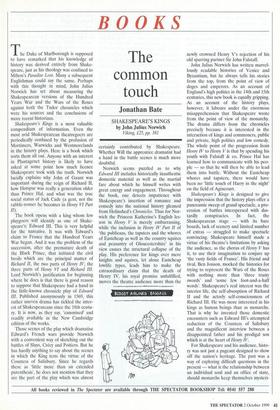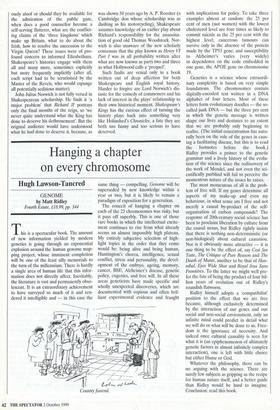BOOKS
The common touch
Jonathan Bate SHAKESPEARE'S KINGS by John Julius Norwich Viking £25, pp. 381 The Duke of Marlborough is supposed to have remarked that his knowledge of history was derived entirely from Shake- speare, just as his theology was confined to Milton's Paradise Lost. Many a subsequent Englishman could say the same. Perhaps with this thought in mind, John Julius Norwich has set about measuring the Shakespearean versions of the Hundred Years War and the Wars of the Roses against both the Tudor chronicles which were his sources and the conclusions of more recent historians.
Shakespeare's Kings is a most valuable compendium of information. Even the most avid Shakespearean theatregoers are periodically confused by the profusion of Mortimers, Warwicks and Westmorelands in the history plays. Here is a book which sorts them all out. Anyone with an interest in Plantagenet history is likely to have asked at some point how much licence Shakespeare took with the truth. Norwich lucidly explains why John of Gaunt was important during the reign of Richard II, how Hotspur was really a generation older than Prince Hal, and what was the true social status of Jack Cade (a gent, not the rabble-rouser he becomes in Henry VI Part II).
The book opens with a king whom few playgoers will identify as one of Shake- speare's: Edward III. This is very helpful for the narrative. It was with Edward's claim to France that the Hundred Years War began. And it was the problem of the succession, after the premature death of the Black Prince, that initiated the civil broils which are the principal matter of Richard II, the two parts of Henry /V, the three parts of Henry VI and Richard III. Lord Norwich's justification for beginning where he does is that there is good reason to suppose that Shakespeare had a hand in the little-known chronicle play of Edward III. Published anonymously in 1569, this rather uneven drama has tickled the inter- est of Shakespeareans since the 18th centu- ry. It is now, as they say, 'canonised' and readily available in the New Cambridge edition of the works.
Those scenes of the play which dramatise Edward's French wars provide Norwich with a convenient way of sketching out the battles of Sluys, Crecy and Poitiers. But he has hardly anything to say about the scenes in which the King tests the virtue of the Countess of Salisbury. Since he regards these as 'little more than an extended parenthesis', he does not mention that they are the part of the play which was almost certainly contributed by Shakespeare. Whether Will the apprentice dramatist had a hand in the battle scenes is much more doubtful.
Norwich seems puzzled as to why Edward III includes historically inauthentic domestic material as well as the martial fare about which he himself writes with great energy and engagement. Throughout the book, one detects impatience with Shakespeare's insertion of romance and comedy into the national history gleaned from Holinshed's Chronicles. Thus for Nor- wich the Princess Katherine's English les- son in Henry V is merely embarrassing, while the inclusion in Henry IV Part II of 'the publicans, the tapsters and the whores of E,astcheap as well as the country squires and peasantry of Gloucestershire' in his view causes the structural collapse of the play. His preference for kings over mere knights and squires, let alone Eastcheap lowlife types, leads him to make the extraordinary claim that the death of Henry IV, his royal promise unfulfilled, moves the theatre audience more than the newly crowned Henry V's rejection of his old sparring partner Sir John Falstaff.
John Julius Norwich has written marvel- lously readable histories of Venice and Byzantium, but he always tells his stories from the top, from the point of view of doges and emperors. As an account of England's high politics in the 14th and 15th centuries, this new book is equally gripping. As an account of the history plays, however, it labours under the enormous misapprehension that Shakespeare wrote from the point of view of the monarchy. The drama differs from the chronicles precisely because it is interested in the interaction of kings and commoners, public and private, high politics and low comedy. The whole point of the progression from Henry IV to Henry V is that by spending his youth with Falstaff & co, Prince Hal has learned how to communicate with his peo- ple — so that he will then be able to lead them into battle. Without the Eastcheap whores and tapsters, there would have been no 'little touch of Harry in the night' on the field of Agincourt.
Shakespeare's Kings is designed to give the impression that the history plays offer a panoramic sweep of grand spectacle, a pro- cession of battles interspersed with das- tardly conspiracies. In fact, the Shakespearean stage — with its bare boards, lack of scenery and limited number of extras — struggled to make spectacle convincing. Shakespeare himself made a virtue of his theatre's limitations by asking the audience, as the chorus of Henry V has it, to use their imagination to conjure up 'the vasty fields of France'. His friend and rival, Ben Janson, mocked the histories for trying to represent the Wars of the Roses with nothing more than 'three trusty swords' and 'some few foot-and-a-half words'. Shakespeare's real interest was the interior life, the self-absorption of Richard II and the actorly self-consciousness of Richard III. He was more interested in his kings as human beings than as monarchs. That is why he invented those domestic encounters such as Edward III's attempted seduction of the Countess of Salisbury and the magnificent interview between a disappointed father and his prodigal son which is at the heart of Henry IV.
For Shakespeare and his audience, histo- ry was not just a pageant designed to show off the nation's heritage. The past was a way of exploring difficult questions in the present — what is the relationship between an individual soul and an office of state, should monarchs keep themselves mysteri- ously aloof or should they be available for the admiration of the public gaze, when does a good counsellor become a self-serving flatterer, what are the conflict- ing claims of the 'three kingdoms' which make up Britain, what to do about the Irish, how to resolve the succession to the Virgin Queen? These issues were of pro- found concern to informed Elizabethans. Shakespeare's histories engage with them all and many more, sometimes explicitly but more frequently implicitly (after all, each script had to be scrutinised by the Master of the Revels, who would expunge all potentially seditious matter).
John Julius Norwich is not fully versed in Shakespearean scholarship. He finds it 'a major problem' that Richard II portrays only the final months of the reign, so we never quite understand what the King has done to deserve his dethronement'. But the original audience would have understood what he had done to deserve it, because, as was shown 50 years ago by A. P. Rossiter (a Cambridge don whose scholarship was as dashing as his motorcycling), Shakespeare assumes knowledge of an earlier play about Richard's responsibility for the assassina- tion of good old Thomas Woodstock. Nor- wich is also unaware of the new scholarly consensus that the play known as Hem VI Part I was in all probability written after what are now known as parts two and three as what Hollywood calls a 'prequel'.
Such faults are venial only in a book written out of deep affection for both Shakespeare and English royal history. Harder to forgive are Lord Norwich's dis- taste for the comedy of commoners and his lack of interest in the plays' relationship to their own historical moment. Shakespeare's Kings has the curious effect of turning the history plays back into something very like Holinshed's Chronicles, a fate they are both too funny and too serious to have deserved.











































































 Previous page
Previous page